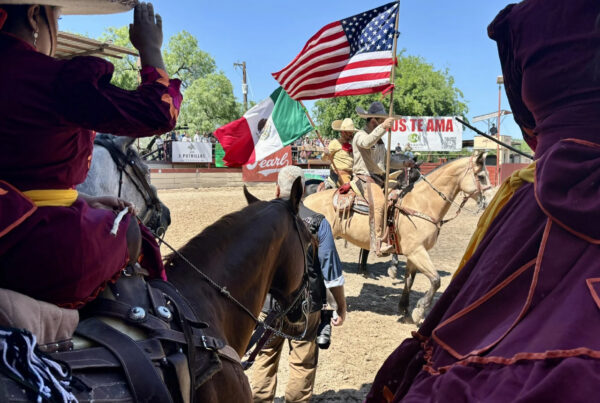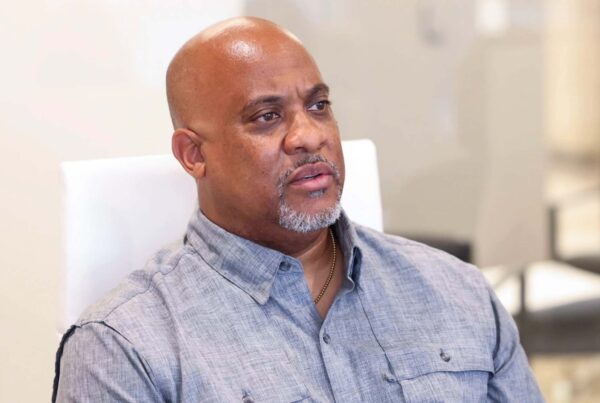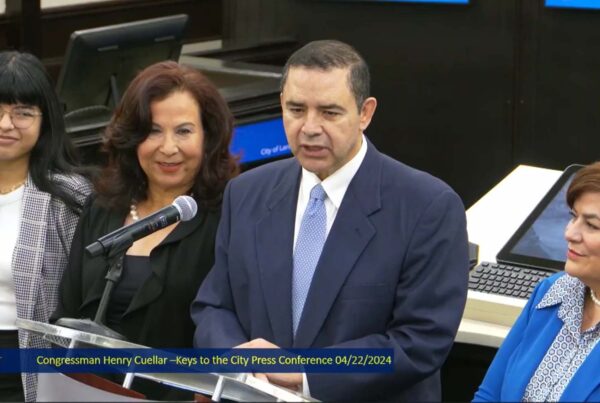Rick Perry served as governor longer than anyone in Texas history. He has also been U.S. energy secretary and a two-time Republican presidential candidate. When Perry left the governor’s mansion in 2015, after 14 years, he was the leader of a vastly transformed state GOP.
In the new book ‘Rick Perry: A Political Life,’ University of Houston professor Brandon Rottinghaus writes that Perry operated as a traditional Republican during his time as governor but presided over many changes in his party – and in Texas – including an embrace of more conservative causes like partisan gerrymandering, abortion restrictions and curbs to LGBTQ rights. Listen to the interview above or read the transcript below.
This transcript has been edited lightly for clarity:
Texas Standard: Congratulations on the book. This is going to be a wonderful read. Let’s begin with Rick Perry, the person. Where does he come from?
Brandon Rottinghaus: He came from a little town in Central Texas called Paint Creek. If you blink, you’re going to miss it. The biggest town nearby is Haskell, and his whole family was from there.
And he comes from a fairly political family; his father was a longtime politician in the region. And I think he just soaked that up, along with just a real sense of how Texans think and the way they operate.
But it wasn’t a big politics family, though. I mean, I think his father was in local politics and they had a cotton farm or something like that.
They did, kind of dry land cotton farming. And I don’t think that governor Perry had any real political aspirations, except that he was really good with people, and the kind of foundation that that had in him definitely propelled him to seek people.
And so when he was at Texas A&M, he was popular. And that led to him being yell leader in a fairly competitive environment.

Courtesy University of Texas Press
I’ve read somewhere that had he not gone to Texas A&M, I think he thought that he would have flunked out of someplace like Texas Tech because he just didn’t have the discipline. And so a lot of that came from the Corps of Cadets, as I understand it. Is that what you’ve learned?
It did. It fundamentally changed his life. It brought him a discipline that he needed in his own mind. It also led him on a career path to be his own person, which was something that you had to have if you were going to run for office in Texas.
So he enters the Air Force, comes out five years later as a captain and begins in politics as a Democrat – which was, we should point out, the majority party in Texas at the time. What sort of legislator was young Rick Perry?
He was a good legislator, by all indications. The speaker of the House at that time, Gib Lewis, was very fond of him; they came from a similar place and had a very similar political perspective, as a lot of people did in that era.
What people told me was that this was a Texas that wasn’t just bipartisan, it was nonpartisan. They were really fighting for the best thing for the state. But they had some tough battles. They had serious economic disasters that took place in the time he was in office. And as a result, public school funding issue became much more pertinent. And they had to really save Texas.
So he was seen as somebody who was reliable. He could get along with people, and he understood people. So when they would have hearings and when they would meet with people, he just intently understood how people thought and could make you feel really good about your position and about his.
So he makes the shift in the late 80s, early 90s, to join the GOP. And then his political career really takes off, right? Becomes an agriculture commissioner. And then I believe he becomes the first lieutenant governor since Reconstruction who counts himself as a Republican, right?
It’s stunning – within the span of a few months, he says he’s leaving the Democratic Party. There’s some indication that, as a lot of people said of that era, that he didn’t leave the party, the party left him. And you see Democrats, conservative Democrats, leaving the party in droves at that point, becoming Republican.
So within a couple of months, he announces he’s running for ag commissioner, which he was underestimated in, and obviously ended up winning. But it was a real sea change in terms of the politics of Texas, where you saw it become a much more conservative version of itself. And Rick Perry adapts himself to this, which is a real consistent story in his political career.
» GET MORE NEWS FROM AROUND THE STATE: Sign up for Texas Standard’s weekly newsletters
And he was lieutenant governor under George W. Bush. How is Perry different from Bush in terms of issues and style?
I think he and then-Governor Bush got along. They were not close, they weren’t intimate, but they had a good working relationship. They were definitely similar in the sense that they both knew people well.
And Governor Bush would go up and down the halls and would meet people talking with staffers and some of the members. Rick Perry would do some of that, but he was a bit more hands-off. I think he understood the Legislature needed room to breathe.
So his approach, although very similar in lots of ways in terms of its accommodation and desire to lay out a kind of series of agenda items, was definitely a little more hands-off, but he made very close relationships and had very close ties to a lot of members that he still has today.
Moving into the Perry era: Perry steps in as governor, and then he’s reelected three times in Texas. I’m not sure that any other Texan has pulled that one off, unless I’m mistaken there.
But he sort of aligns himself with a lot of more far-right issues: He becomes an opponent of LGBTQ rights. He takes on abortion. Immigration becomes a thing. But where does he sit compared to the party today?
Yeah, it’s a really good question, because it’s a question that gets to the heart of how the state has politically changed since Rick Perry became a politician.
In his final speech as governor, he made the following quote: “It’s not where you come from, but where you go.” He drew on this analogy from Americans heading west in the 1800s – and of course, many into Texas – looking for a second chances.
Rick Perry’s story is a story of second chances. Like you say, he starts as a kind of conservative Democrat and really adapts himself politically to the new world in the Republican Party.
So, pushing for cuts to public education, strict abortion bills, partisan gerrymandering, tough voting reforms are things that happen gradually for him. But there are other things where he was a more or less traditional Republican – expanding high access to higher ed, trying to develop the ‘Texas miracle” through low taxes and small government, criminal justice reforms, eventually, too.
So his legacy is quite broad and really does kind of give us a sense of that scope of change.
And yet at the same time, he was derided at the time as ‘Governor Good Hair,’ remember?
I do, and I actually fought to have that as the title to the book, but I got outvoted, I guess you could say.
But I think that’s funny because there is a sort of sense that people didn’t take him seriously enough. But he, as you said, broke many barriers, not just for a Republican but also for an Aggie in Texas. And it really did change the state.
We need to turn to Rick Perry’s big turn running for president in 2012 and then again in 2016. Why did he do that, first of all, and I wonder what it says about not just his political ambition, but what animates him politically?
Yeah, there’s a long legacy of Texas politicians seeing those bright pastures eastward. Perry was no different. He definitely was encouraged to run at a moment when the state was doing very well and his political stock was extremely high.
He got in the race a little late, and he had some issues because his back surgery had definitely put him on some bad footing. He was not at his best, and he admits this was true. So, some obvious mistakes got made.
But I think he kind of emerges in the Republican Party at national level at a time where there is this real divide. One of the reasons that the campaign ends up being less successful is that he has to take a firm line on how immigration is going to be handled. One of the things he goes to battle with fellow Republicans on is a story about having in-state tuition for people who are undocumented. That meant that he was going to sacrifice votes, but that’s the way he felt, and that’s what he fought for in Texas.
Yeah, he sort of seemed to double down on that. He accused fellow GOP leaders of having no heart when they opposed granting in-state tuition to undocumented immigrants. In a way, he becomes a kind of player in a larger political story, it seems to me, when you’re writing that book on Texas politics, no?
I fully think that’s right. And that’s just the way that he was. He had a big heart. Senator [Leticia] van de Putte told me that he just wasn’t mean enough to be president; he wasn’t mean enough to be a national politician. He felt things for people and understood that there was a real political advantage to this. But that’s the way he was.
He just wasn’t willing to throw those punches that could knock out someone who might be a potential ally or who was an ally.
And he held on to those beliefs, and although they were challenged, and the right and left, he thought that this is the best thing for Texas.
As you think about some of the big names in Texas politics, some of the legends, where does Rick Perry fit in that panoply, and what do you think his political legacy is in Texas?
I think if we were going to carve a Mount Rushmore-style monument to Texas governors that we would definitely put Rick Perry up there. He is one of the most important in the state’s history, not just for what he did, but for the length of time he was in office. We put him up there with Sam Houston and with Jim Hogg and with Alan Shivers, all of whom had a serious effect on their party or their policies.
The reason this is true is because Rick Perry had a hand in all of the policies that came out of the state between the 80s and the late 2000s, where you saw criminal justice reform as a huge issue. You saw the “Texas miracle” as a major draw point for businesses to come to Texas. You also saw contentious politics like abortion bills. You saw partisan gerrymandering, which led to the Legislature leaving town. You saw tough voting reform.
So it’s a story about a legacy of a governor. But it’s also obviously important to understand because it’s really a tale of how Texas politics has changed.













